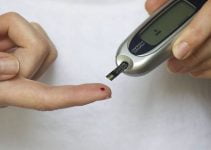It would be wrong to think that menstruation has only to do with fertility. Regular periods indicate adequate levels of hormones and optimal health. Anything that disrupts hormone levels may cause menstrual abnormalities.
Thus, regular periods also indicate normal endocrinal, metabolic, and even mental health. Almost any kind of chronic illness may alter periods, but some problems may even cause them to stop suddenly.
What causes menstruation to stop suddenly?
When menstruation stops suddenly in those who had regular cycles before, it is called secondary amenorrhea. It is a secondary effect of some disease or medication. It means that there is a need for identifying the primary cause before seeking the remedy.
During the normal menstrual cycle, estrogen, which is a primary female hormone, rises. This rise in estrogen causes the thickening of the uterus’s inner lining as the body prepares for pregnancy.
However, if a female does not get pregnant, the body sheds this thickened inner lining of the uterus, causing menstruation. Anything that alters the levels of estrogen may also lead to menstrual changes.
Though there can be numerous reasons for changes in estrogen levels and discontinuation of periods, below are some of the most frequent causes.
Below are some of the most common reasons causing menstruation to stop suddenly:
Pregnancy
It is one of the most common reasons for the sudden cessation of the menstrual cycle. Studies show that almost every second pregnancy in the developed nations is unplanned. Unplanned pregnancies are so common in the western world that researchers are calling it a kind of epidemic.
And one of the first and major signs of such a pregnancy is sudden discontinuation of menstruation. If a woman of childbearing age has a missed period, pregnancy is the first thing to consider[1].
Although pregnancy is not a disease, rather a normal physiological state, nonetheless, for many women, it may cause anxiety, especially when unplanned.
Menopause
It is another common cause of menstruation cessation and something that will happen to every woman earlier or later. Although it rarely occurs suddenly, it may be abrupt and come as a surprise in some cases.
For most women, menopause comes after 45 or even 50 years of age, but in some, it may come even before the age of 40. Studies show that women with early menopause are at a more significant risk of heart diseases, although they have a lower chance of breast or endometrial cancer [2].
PCOS
It is a common metabolic disorder leading to hormonal imbalances that may finally cause menstruation to stop suddenly. PCOS is not a rare condition anymore. It is common in women of childbearing age, and regretfully it is even on the rise in adolescents.
Some of its common signs apart from amenorrhea are obesity, polycystic ovaries, hyperandrogenism, insulin resistance [3].
Mood and emotional disorders
Conditions like anxiety and depression are not uncommon. Emotional illnesses are chronic, and they have a broad impact on wellbeing. They increase the risk of numerous other disease conditions like metabolic disorders, sleep disorders, cardiovascular conditions, endocrinal problems.
Studies show that depression is commonly diagnosed in those living with amenorrhea. Since anxiety, depression, or other mood disorders may frequently be neglected due to the absence of significant physical signs, sudden stopping of the menstrual cycle in many may indicate the condition [4].
Medications
Pharmacological drugs may also lead to amenorrhea. Studies show that it is quite common with antipsychotics and antidepressants. In many cases, it could also be due to substance abuse [5].
Hormonal imbalances
Studies show that about 5-6% of females cannot conceive a child even on regular sex due to menstrual irregularities and resulting fertility problems. There could be numerous reasons for such hormonal imbalances like psychological problems or chronic ailments.
Oncological conditions and their treatment (chemotherapy, radiation therapy) often lead to sudden discontinuation of menstruation [6].
On discontinuation of birth-control pills
It is a well-known phenomenon reported way back in the 1960s when oral contraceptive use became widespread. In many females, sudden discontinuation of birth control pills leads to discontinuation of periods, too. It happens due to hormonal issues.
All birth control pills contain female hormones, and on their discontinuation, there is an abrupt deficiency of these hormones leading to amenorrhea and fertility problems. Fortunately, in most cases, the problem is temporary.
After some time, the body adjusts itself, and one may again have regular cycles. However, some females may require medical treatment to manage condition [7].
Excessive exercise and stress
Exercise is good for health, but not excessive exercise. Problems associated with periods are quite common among professional athletes, as they train too intensively, causing widespread metabolic changes.
This overexertion and stress often lead to hormonal changes causing sudden stopping of the menstrual cycle. Extreme physical and mental stress may cause menstrual dysfunction even in specific art forms like in professional ballet dancers [8, 9].
Conclusion
Management of amenorrhea depends on its primary cause. If the reason is emotional disorders like depression, treating it may help. If it is a result of taking certain medications, the doctor may prescribe alternative drugs.
Quite often, doctors would treat these conditions with the help of hormonal drugs. Additionally, lifestyle changes, like regular exercise, may help. Dietary changes can also help in many situations.
References
-
1. Grimes DA. Unplanned pregnancies in the United States. Obstet Gynecol. 1986;67(3):438-442.
2. Ossewaarde ME, Bots ML, Verbeek ALM, et al. Age at Menopause, Cause-Specific Mortality, and Total Life Expectancy. Epidemiology. 2005;16(4):556-562.
3. Rachmiel M, Kives S, Atenafu E, Hamilton J. Primary Amenorrhea as a Manifestation of Polycystic Ovarian Syndrome in Adolescents: A Unique Subgroup? Arch Pediatr Adolesc Med. 2008;162(6):521. doi:10.1001/archpedi.162.6.521
4. Fava GA, Trombini G, Grandi S, et al. Depression and anxiety associated with secondary amenorrhea. Psychosomatics. 1984;25(12):905-908. doi:10.1016/S0033-3182(84)72922-7
5. Harlow SD, Cohen M, Ohmit SE, et al. Substance use and psychotherapeutic medications: A likely contributor to menstrual disorders in women who are seropositive for human immunodeficiency virus. American Journal of Obstetrics and Gynecology. 2003;188(4):881-886. doi:10.1067/mob.2003.209
6. Fourman LT, Fazeli PK. Neuroendocrine Causes of Amenorrhea—An Update. J Clin Endocrinol Metab. 2015;100(3):812-824. doi:10.1210/jc.2014-3344
7. Gambrell RD, Greenblatt RB, Mahesh VB. Post-pill and pill-related amenorrhea-galactorrhea. American Journal of Obstetrics and Gynecology. 1971;110(6):838-848. doi:10.1016/0002-9378(71)90581-3
8. Cohen JL, Kim CS, Jr PBM, Ertel NH. Exercise, Body Weight, and Amenorrhea in Professional Ballet Dancers. The Physician and Sportsmedicine. 1982;10(4):92-101. doi:10.1080/00913847.1982.11947206
9. Ab L, Sm H. Athletic amenorrhea: a review. Med Sci Sports Exerc. 1985;17(1):56-72.




 Dr. Preet Pal SB is a physician (M.D. Medicine) with a specialization in diabetes (Fellowship in diabetes, Royal Liverpool Academy). He has a particular interest in metabolic disorders, considering that they are rising in every corner of the world, more so in India.
Dr. Preet Pal SB is a physician (M.D. Medicine) with a specialization in diabetes (Fellowship in diabetes, Royal Liverpool Academy). He has a particular interest in metabolic disorders, considering that they are rising in every corner of the world, more so in India.